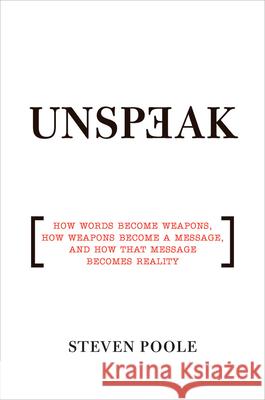Unspeak: How Words Become Weapons, How Weapons Become a Message, and How That Message Becomes Reality » książka
Unspeak: How Words Become Weapons, How Weapons Become a Message, and How That Message Becomes Reality
ISBN-13: 9780802143051 / Angielski / Miękka / 2007 / 288 str.
What do the phrases "pro-life," "intelligent design," and "the war on terror" have in common? Each of them is a name for something that smuggles in a highly charged political opinion. "Climate change" is less threatening than "global warming"; we say "ethnic cleansing" when we mean "mass murder," A completely partisan argument can be packed into a sound bite. Words and phrases that function in this special way go by many names. Some writers call them "evaluative-descriptive terms." Others talk of "terministic screens" or discuss the way debates are "framed." Author Steven Poole calls them Unspeak. Unspeak represents an attempt by politicians, interest groups, and business corporations to say something without saying it, without getting into an argument and so having to justify itself. At the same time, it tries to unspeak--in the sense of erasing or silencing--any possible opposing point of view by laying a claim right at the start to only one way of looking at a problem. Recalling the vocabulary of George Orwell's 1984, as an Unspeak phrase becomes a widely used term of public debate, it saturates the mind with one viewpoint while simultaneously make an opposing view ever more difficult to enunciate. In this fascinating book, Poole traces modern Unspeak--from "extremist" to "weapons of mass destruction"--and reveals how the evolution of language changes the way we think. "Propaganda" becomes "public diplomacy," and "sound science" (a phrase actually coined by tobacco giant Philip Morris) becomes a tool with which to instill a fear and distrust of legitimate scientific research.











